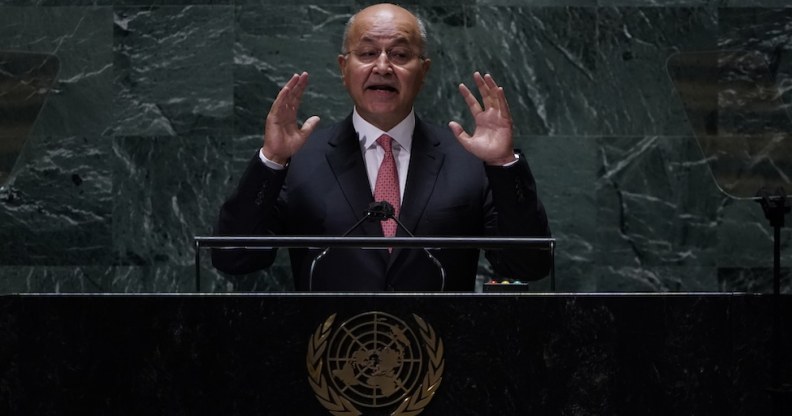Iraqi armed forces are raping, torturing and murdering LGBT+ people, report says

Barham Salih, President of Iraq. (Getty/ Timothy A. Clary)
LGBT+ people in Iraq are being hunted, abducted, tortured, raped and murdered by armed groups, including police and security forces, according to a new report.
The report from Human Rights Watch, supported by Iraqi LGBT+ rights group IraQueer, included 54 interviews with LGBT+ Iraqi people, as well as with six witnesses to killings and abductions by armed groups of LGBT+ people.
According to the report, attacks on LGBT+ people were committed by police, government security forces, and state-sponsored armed groups dedicated to hunting down and attacking queer Iraqis.
Of the 54 people interviewed, the report recorded eight cases of abductions, eight cases of attempted murder, four extrajudicial killings, 27 cases of sexual violence —including gang rape — 45 cases of threats to rape and kill, and 42 cases of online targeting by individuals who identified themselves as members of armed groups against LGBT+ people in Iraq.
In eight of these cases, the abuses was against LGBT+ children as young as 15.
Human Rights Watch said: “In Iraq, a hairstyle, fashion sense, or polished nails could be tantamount to a death sentence. Since 2005, Iraqi armed forces have launched attacks against individuals marked as LGBT+ based primarily on their appearance and ‘suspicion’ of same-sex conduct.
“While kidnappings, torture, and killings of LGBT+ people and those perceived as LGBT+ by Iraqi armed forces has been repeated, government officials have absolved themselves of responsibility and instead have claimed that these abusive armed forces were attempting to stand as protectors for morals and religious traditions.”
Although homosexuality is actually legal in Iraq, LGBT+ people are criminalised under a variety of laws prohibiting public indecency, disturbing public peace, “immodest acts”, and a ban on any “movement” that seeks to “change the fundamental principles of the constitution or the basic laws of society”.
However, most of the arrests of those interviewed had “no legal basis in domestic law”.
The state-sponsored anti-LGBT+ armed groups “feed on poverty, offering unemployed men a job and the prospect of gaining power and influence through violence”, the report said.
The groups are “not unitary entities, but are comprised of networks operating in disorganised patterns for an organised intent, maintaining the ‘social order’ and policing notions of ‘morality'”.
Although the activities of these groups, like torture and murder, are not legal in Iraq, every single LGBT+ interviewee said they would not report crimes to the police, “creating an environment in which police and armed groups can abuse them with impunity”.
“The public nature of the abuses documented, mostly occurring in broad daylight in the streets, coupled with their chilling intentionality, signal the climate of impunity afforded to perpetrators,” the report says.
The only way that LGBT+ people are able to protect themselves is to either hide their identities, or if they are unable to, commit to “a form of self-imposed house arrest”.
Of the 54 LGBT+ people interviewed, 16 said they had attempted to take their own lives at least once.
Human Rights Watch demanded that the Iraqi government take responsibility for “protecting Iraqis’ right to life”, and said: “Iraqi authorities should investigate all reports of armed group or other violence against people targeted due to their actual or perceived sexual orientation or gender identity and expression, prosecute, fairly try, and appropriately punish those found responsible, and publicly and expressly condemn all such violence.
“The government should take all appropriate measures to end torture, disappearances, summary killings, and other abuses based on sexual orientation and gender expression and identity, and compensate the families of all victims of unlawful killings and survivors of serious abuse.”
The organisation also called on “states providing military, security, and intelligence assistance to Iraq, including the United States, the United Kingdom, Germany, and France, to urge Iraqi authorities to investigate allegations of abuses by armed groups and the role of their own assistance in these alleged violations”.
These countries should “suspend military, security, and intelligence assistance to units involved in these violations and explain any suspension or end to military assistance publicly”, and continue this suspension until Iraq “adopts measures to end these serious human rights violations”.

